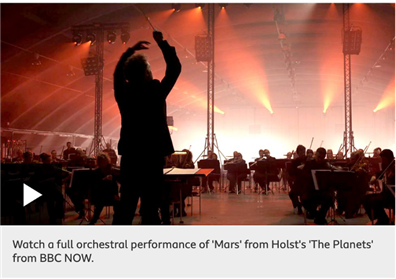Hello Year 2!
I hope you are enjoying learning at home, and having fun on our musical trip to Mars.
Today, you will need a pencil, some paper, some form of drum and your imagination!
Did you have fun listening to the two very different pieces of music from
‘Mars, Bringer of War’ last time? Which words did you find to describe the music?
What sort of actions did you create for each piece? Were some actions SMOOTH
and some SPIKEY? And how colourful were your pictures?
I am looking forward to seeing your drawings and reading about all your movements.
Playing Rhythms
A rhythm is a musical pattern. Today we are going to be playing some of the
rhythms we heard in the two short pieces from last time. What can you use as a
drum? Look in the kitchen, a wooden spoon and plastic bowl will be perfect!
You might want to listen to the whole piece again, to remind you of how dramatic
‘Mars, Bringer of War’ sounds.
Please click on the picture below to go to the film - and click on the second picture
down on the top left of the screen:
Activity
| 1. |
Do you remember who wrote ‘Mars, Bringer of War’?
|
|
|
|
It was an English composer called Holst, and it was one of seven pieces written to describe the planets, as part of
a bigger piece (or orchestral suite) called ‘The Planets’. |
|
| 2. |
Please listen to the first piece you listened to last week, the SPIKEY music:
|
MARS – PIECE 1
|
|
|
Can you clap along with the pulse or beat? It is very difficult because the drums are not playing to a steady time. |
|
|
|
Now, please listen to the slower version:
|
MARS – PIECE 1 - SLOWER
|
|
|
The rhythm is difficult to count, it might be easier to just listen and follow the music!
Do you think you can drum or clap along top the rhythm? It is fun to try! |
|
| 3. |
Please listen to the second piece from last week, the SMOOTH music:
|
MARS – PIECE 2
|
|
|
Can you clap along with the pulse and then the pattern of the smooth tune?
If you listen carefully, you can hear the spikey drums playing somewhere in the background. |
|
|
|
Now, please listen to the music slowed down:
|
MARS – PIECE 2 - SLOWER
|
|
|
This is now very smooth, and much easier to play along to than the spikey piece.
|
|
| 4. |
Let’s play along to a different piece of music. ‘In the Hall of the Mountain King’ is by a Norwegian composer called Grieg.
|
|
|
|
Here it is at full speed: Can you try to keep up with the beat? You can definitely hear the fast marching sound: |
THE MOUNTAIN KING – PIECE 3
|
|
|
Here is the music slowed down:
|
THE MOUNTAIN KING – PIECE 3 - SLOWER
|
|
|
Please try to play your drum or clap along to the beat and then have a go at the rhythm.
|
|
| 5. |
Which piece is your favourite to play along to? Can you think of three reasons why? |
|
We have completed our trip to Mars and are now headed back home. I hope you have enjoyed it.
Thank you very much for working so hard on this, you have listened very carefully to some complicated music.
I hope you enjoyed playing your drum and clapping along – almost like taking part in the performance!
Mrs Sumner
Thank you to the BBC for making these resources available for us to use.
Autumn Term 2025
Fun, Inspiring (and often quite loud!) Music Lessons for Home School Hubs and Primary Schools
Specialising in:
- Primary Music Curriculum provision
- Whole Class Instrumental teaching
- Includes free use of instruments!
07941 282311
In association with
Little Strummers
"I found it very interesting and I thought that children learned about rhythm, by using body percussion without even realising that they were in a lesson, because it was so much fun for them!"
"I would highly recommend it!"
"I thought the song was lovely - there was a nice mix of playing the bowls, clapping, singing and actions. The whole idea of kitchen percussion is a brilliant one for lockdown but good in usual times too."
"The level of what you did/taught was perfect for their age and similar to things they do at school."
"The children all thoroughly enjoyed the session and were engaged throughout. They enjoyed having the opportunity to hold their own ukulele and learn to play along to some simple songs."
"The session was delivered brilliantly and the different stages were broken down into small sections to allow all children to participate."

